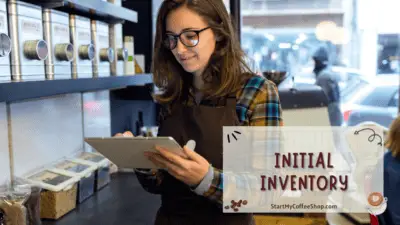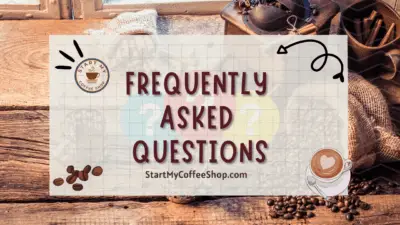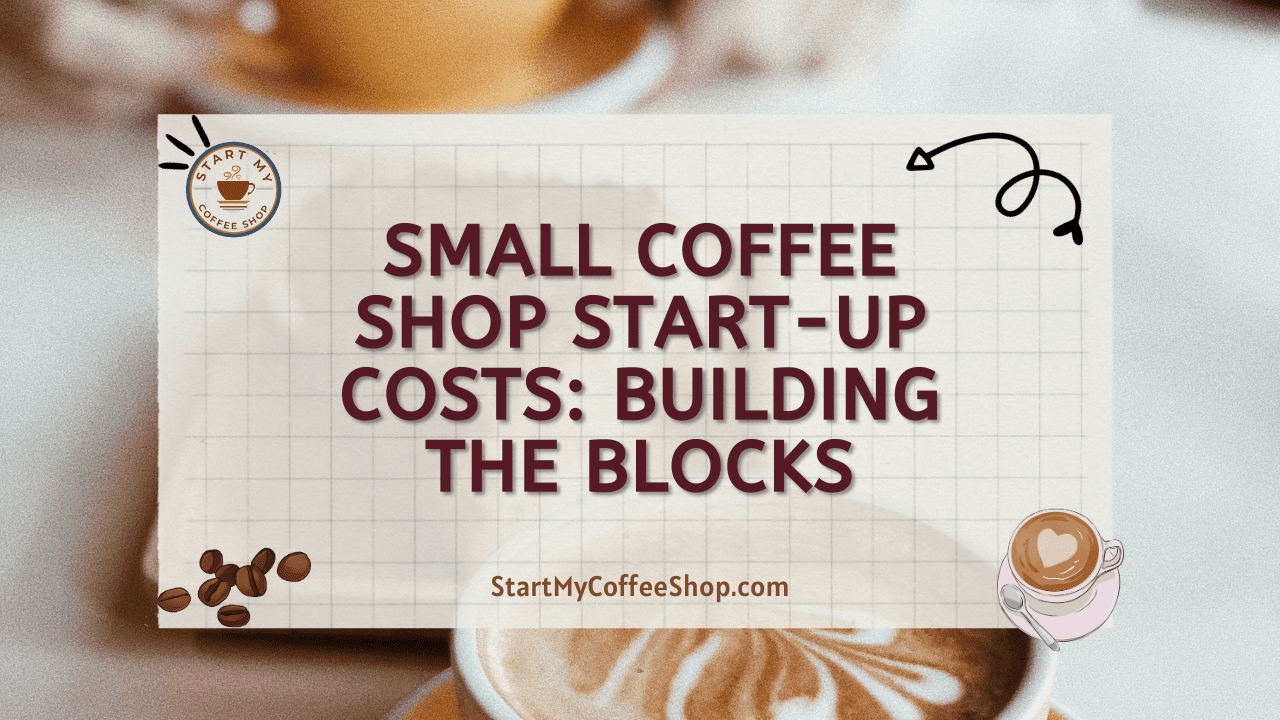Starting a small coffee shop can be an exciting and thrilling venture. However, like any business, it’s important to have a clear understanding of the costs involved.
A small coffee shop’s start-up costs can vary depending on factors such as location, equipment, renovations, licenses, inventory, marketing, and staffing. It’s essential to conduct thorough research and create a detailed budget to estimate these expenses accurately.
In this article, I will provide you with an overview of the start-up costs associated with opening a small coffee shop.
Location
Selecting the right location for your coffee shop is a vital decision that can significantly impact its progress. The cost of the location is a major consideration and is influenced by various factors, including the city, neighborhood, and size of the space. Rent or lease expenses often constitute the largest expenditure in this category.

Conducting thorough research on the local rental market is essential. Analyze rental prices in different areas to find the balance between cost and potential profitability. Consider the demographic characteristics of the neighborhood and the target audience you aim to attract. Are there enough potential customers in the vicinity? Understanding the foot traffic patterns, especially during peak hours, can provide valuable insights into the location’s viability.
Proximity to complementary businesses is another crucial aspect. Being located near offices, schools, or shopping centers can increase the chances of attracting customers. Collaborating with nearby businesses can also lead to mutually beneficial partnerships and cross-promotion opportunities.
Furthermore, it’s important to assess the competition in the area. While some level of competition can indicate a thriving coffee culture, too much saturation may make it challenging to carve out a unique identity. Consider the market share you can capture and whether there’s sufficient demand to support your business.
Ultimately, finding the right location requires a thoughtful balance between cost, foot traffic, demographics, and competition. By carefully evaluating these factors, you can position your coffee shop for growth and create a space that appeals to your target customers.
Read more about: Mobile Coffee Trailer Business Plan: Your Mobile Java Journey
Equipment
Equipping your coffee shop with the necessary tools is crucial for smooth operations. The cost of the equipment can vary based on factors like quality, brand, and whether you opt for new or used items.
Here are some essential equipment items and their approximate costs to give you an idea:
- An espresso machine is the heart of any coffee shop, and prices range from $3,000 to $20,000 depending on the features and capacity you require. A good-quality coffee grinder, essential for freshly ground beans, can cost anywhere from $200 to $1,500. Commercial coffee makers, which are efficient for large batches, typically range from $200 to $1,000.
- Investing in reliable refrigeration units is crucial for storing ingredients and perishables, with costs ranging from $1,500 to $10,000 depending on the size and features. Display cases and shelving for showcasing pastries and merchandise can cost between $500 to $2,000.
- Don’t forget to include a point-of-sale (POS) system in your budget, which helps with transactions and inventory management. A basic POS system can range from $1,000 to $3,000, depending on the complexity and additional features you need.
- Apart from these major items, remember to account for the cost of small wares like utensils, cups, packaging materials, and cleaning supplies. These items are essential for day-to-day operations and customer satisfaction.
While it may be tempting to cut costs on equipment, it’s important to prioritize quality and durability. Investing in reliable equipment will ensure efficiency, reduce downtime, and maintain the consistency of your coffee offerings.
Renovations and Interior Design
Designing an appealing and cozy ambiance is essential in drawing customers to your coffee shop. Renovations and interior design costs will vary depending on factors such as the initial condition of the space and the extent of the changes you envision.
Here are some typical expenses to consider when creating your budget:

- Painting the walls with fresh, vibrant colors can breathe new life into the space and create a welcoming atmosphere. Costs for painting will depend on the size of the area, the type of paint, and whether you hire professionals or do it yourself.
- Flooring is another important aspect that can significantly impact the overall look and feel of your coffee shop. Consider options like hardwood, tiles, or polished concrete, taking into account durability and ease of maintenance. Costs will depend on the materials chosen and the square footage of the area.
- Thoughtful lighting can enhance the ambiance and create a cozy atmosphere. From pendant lights to track lighting, the options are vast. Consider hiring a professional electrician to ensure safety and proper installation.
- Investing in comfortable and stylish furniture is crucial for creating a welcoming environment. Consider the number of seating options required, including tables, chairs, couches, and outdoor seating if applicable. Costs will vary based on the quality and style of the furniture you choose.
- Signage is an important element for attracting customers and communicating your brand. Consider investing in eye-catching and informative signage, both for exterior and interior purposes. Costs will depend on the size, materials, and complexity of the signage.
Read more about: Mobile Coffee Shop Business Plan: Coffee Wherever You Go
Depending on the scope of your renovation project, costs can range from a few thousand dollars to tens of thousands. It’s crucial to create a detailed plan, consult with professionals, and obtain multiple quotes to ensure you stay within your budget.
Licenses and Permits
Operating a coffee shop legally requires obtaining the necessary licenses and permits, which can vary depending on your location. To ensure compliance and a smooth operation, it’s crucial to research and understand the specific regulations in your area.
Here are some common licenses and permits to consider:
- A business license is typically required to legally operate any business, including a coffee shop. The cost of a business license can vary depending on local regulations and the size of your establishment.
- Health department permits are essential for food-related businesses. These permits ensure that your coffee shop meets health and safety standards. Costs for health department permits can vary depending on the specific requirements and inspections involved.
- If you or your coffee shop employees handle food directly, a food handler’s permit may be necessary. This permit demonstrates knowledge of safe food handling practices and may require completing a training course or passing an exam.
- If you plan to serve alcoholic beverages in your coffee shop, you will likely need a liquor license. The cost of a liquor license varies significantly depending on factors such as your location, the type of license, and local regulations.
- Signage permits may be required for displaying signs and advertisements on your coffee shop’s premises. Costs for signage permits can vary depending on the size, location, and duration of the signage.
- Additionally, playing music in your coffee shop may require music licensing fees to ensure compliance with copyright laws. The costs associated with music licensing will depend on factors such as the size of your establishment and the type of music being played.
Initial Inventory

Conducting thorough market research is vital to understand the demand for specific items and estimating your expected sales. By analyzing customer preferences and trends, you can make informed decisions about the types and quantities of inventory you need.
Consider the popularity of different coffee beverages, the demand for specialty items like alternative milk options or organic products, and the variety of pastries and snacks you plan to offer. This information will help you determine the appropriate inventory level and budget accordingly.
When budgeting for inventory, it’s important to strike a balance between having enough stock to meet customer demand and minimizing waste. Ordering in bulk can often result in cost savings, but it’s crucial to ensure that perishable items have a reasonable shelf life to avoid spoilage.
Regularly reviewing and adjusting your inventory based on sales data and customer feedback is essential to maintain an efficient and stable operation. By keeping a close eye on inventory turnover and adjusting your purchasing decisions accordingly, you can optimize your costs and ensure you always have the right products available for your customers.
Read more about: Mobile Coffee Cart Business Plan: Hitting the Road with Coffee
Marketing and Branding
Promoting your coffee shop is a vital step in attracting customers and establishing a strong brand presence. Marketing and branding expenses encompass various aspects, including designing a captivating logo that represents your coffee shop’s identity.
Creating a visually appealing and user-friendly website is crucial for online visibility and customer engagement. Additionally, printing menus that enticingly showcase your offerings is essential for in-store marketing.
Investing in eye-catching signage, both exterior and interior helps grab the attention of passersby and creates a distinct presence in the local area. Advertising campaigns, whether through digital channels or traditional mediums like newspapers and magazines, allow you to reach a wider audience and generate awareness about your coffee shop.
Allocating a portion of your budget to marketing efforts is crucial to ensure your coffee shop receives the visibility it deserves. Building a brand image and effectively communicating your unique selling propositions can significantly impact customer perception and attract a loyal customer base.
Consider working with professionals or hiring marketing consultants to develop a comprehensive marketing strategy tailored to your coffee shop’s target audience. They can help you identify the most effective channels and tactics to maximize your marketing budget and drive customer engagement.
Remember, consistent branding and a well-executed marketing campaign can differentiate your coffee shop from the competition and create a strong presence in the minds of potential customers.
Staffing
Hiring and training competent staff is essential for ensuring the achievement of your coffee shop. The number of employees you need and the wages you offer will depend on the size of your shop and the range of services you provide.
When budgeting for staffing expenses, it’s important to consider the costs associated with recruitment, salaries, training, and employee benefits. Allocating resources to finding skilled and friendly baristas, reliable kitchen staff, and efficient customer service personnel is crucial for maintaining a high level of service and customer satisfaction.
Investing in training programs and ongoing professional development for your staff can further enhance their skills and contribute to a positive work environment. By carefully considering your staffing needs and budgeting appropriately, you can build a team that will help your coffee shop thrive.
Summary
Starting a small coffee shop involves various costs that need to be carefully considered and planned for. By thoroughly researching and estimating these start-up costs, you can develop a realistic budget and financial plan for your coffee shop venture. Remember, while there are upfront expenses, a well-executed coffee shop business can provide an enjoyable and memorable experience. Good luck with your coffee shop start-up journey!
Frequently Asked Questions

Q: How much does it cost to rent a location for a small coffee shop?
A: The cost of renting a location for a small coffee shop can vary significantly based on factors like the city, neighborhood, and size of the space.
Q: What equipment is essential for a small coffee shop, and how much does it cost?
A: Essential equipment for a small coffee shop includes an espresso machine, coffee grinder, commercial coffee maker, refrigeration units, display cases, shelving, and a POS system.
Q: What licenses and permits are required to open a small coffee shop?
A: Common requirements include a business license, health department permits, food handler’s permit, liquor license (if serving alcohol), signage permits, and music licensing fees.
To learn more on how to start your own coffee shop, check out my startup documents here.
Disclaimer: The information provided by StartMyCoffeeShop.com (“The Site”) is for general informational purposes only. All information on the Site is provided in good faith. However, we make no representation or warranty of any kind, express or implied, regarding the accuracy, adequacy, validity, reliability, availability, or completeness of any information on the Site. Under no circumstance shall we have any liability to you for any loss or damage of any kind incurred as a result of the use of the Site or Reliance on any information provided on the Site. Your use of the Site and reliance on any information on the Site is solely at your own risk. This blog post is for educational purposes only and does not constitute legal advice. Please consult a legal expert to address your specific needs. Terms and Conditions. (https://startmycoffeeshop.com/terms-and-conditions/)

Hi! I’m Shawn Chun
My adventure in coffee began when I first launched my first coffee shop back in the early 2000s. I had to figure out so many things on my own and to make it worse within 2 years of opening two large corporate coffee chains moved in just blocks away from me!
As I saw smaller and even some larger coffee shops in the neighborhood slowly lose customers to these giant coffee chains and slowly close up shop, I knew that I had to start getting creative…or go out of business.
I (like you may be) knew the coffee industry well. I could make the best latte art around and the foam on my caps was the fluffiest you have ever seen. I even had the best state-of-the-art 2 group digital Nuova Simonelli machine money could buy. But I knew that these things alone would not be enough to lure customers away from the name brand established coffee shops.
Eventually, through lots of trial and error as well as perseverance and creativity I did find a way to not only survive but also thrive in the coffee/espresso industry even while those corporate coffee chains stayed put. During those years I learned to adapt and always faced new challenges. It was not always easy, however, in the end, I was the sole survivor independent coffee shop within a 10-mile radius of my location. Just two corporate coffee chains and I were left after that year. All told the corporate coffee chains took down over 15 small independent coffee shops and kiosks and I was the last one standing and thriving.
Along the years I meet others with the same passion for coffee and I quickly learned that it is not only “how good a barista is” that makes a coffee shop successful, but the business side of coffee as well.
Hence why I started this website you are on now. To provide the tools and resources for up and coming coffee shop owners to gain that vital insight and knowledge on how to start a coffee shop successfully.
Stick around, browse through my helpful blog and resources and enjoy your stay! With lots of LATTE LOVE!
Shawn







